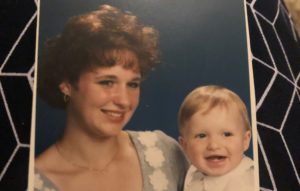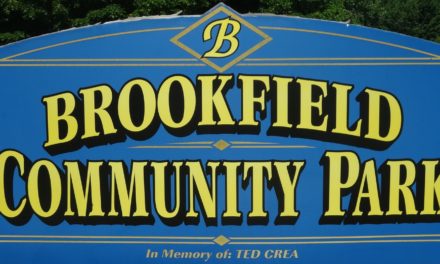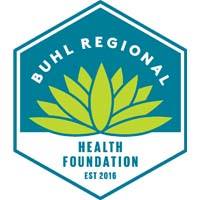
Amy Zell and her son, Tyler Neral-Contributed photo
The English language is loaded with euphemisms, phrases that mean a certain word or concept, but say it
in a kinder, gentler way, one that eases the impact of the word or concept that is being sidestepped.
There are times when euphemisms do more harm than good.
Amy Zell, suicide postvention event coordinator for LOSS Community Services, Columbus, said that if
you suspect that someone is contemplating suicide, it’s best not to beat around the bush.
“Don’t be afraid to ask, and ask the question straight up, ‘Are you thinking about suicide? Are you
considering suicide?’” said Zell, of Brookfield. “It’s so important to say the word.”
Do not ask someone if they are thinking about hurting themselves, she said.
“A lot of times, people who are going through that, they don’t think they’re hurting themselves,” she said.
“They just want to end pain. They’re in so much pain.”
September is Suicide Prevention Awareness Month, but Zell has been on a quest to raise awareness of
suicide since Nov. 15, 2009, the day her 16-year-old son, Tyler Neral, died by suicide.
Tyler was an awesome kid, Zell said. His memory makes her smile, even though his loss was devastating.
Tyler used to wipe her tears when she was going through a divorce. He took all of his books to his third-grade classroom to start a library benefiting classmates who did not otherwise have access to books. In
seventh-grade, he donated Teddy Grams to a community center in a nearby town.
In ninth-grade, when a friend was suicidal, he went into crisis response mode.
“He was so concerned about it,” Zell said. “He talked to her mom, he talked to her, he talked to
everybody that he could think of. Everybody was like, she’s fine, don’t worry about it, she’s looking for
attention. He came to me, as a mom. (He said,) ‘I need you to go to the school and I need you to go tell the
principal so the principal tells the teacher because there’s a field trip coming up and, for some reason, I
have a bad feeling.’ That’s how he was.”
 Tyler was “always taking care of everybody else,” she said. “Phenomenal kid.”
Tyler was “always taking care of everybody else,” she said. “Phenomenal kid.”
But, in the year before his death, he started to change, Zell said. “I noticed that he started to walk different. He walked with his head down more. He wasn’t as bright as he had been. He didn’t want to get his driver’s license, that car was a dangerous thing.”
Three kids at school had died in a short span of time, two by car accidents and one by an overdose, she
said. He started losing his empathy, replacing it with anger.
Zell communicated to Tyler more, made changes at home with safety in mind, and suggested that he get
counseling, which he wasn’t interested in.
On Sept. 15, 2009, he tried to kill himself. It was a half-hearted attempt, one he knew would fail, but
something he said he needed to do so he could reach out to Zell, she said.
Tyler spent two weeks in a hospital, was put on medication, and Zell tried to find other methods of
helping him. He seemed to be improving, and there were signs that the Tyler she knew was returning. On
the day he died, he assured his parents he was OK and wasn’t suicidal.
About two weeks after Tyler’s death, Zell called the American Foundation for Suicide Prevention “to see
what we could do, what kind of things can we do for prevention, and been in that mode ever since.”
“That’s Tyler’s legacy,” she said of devoting herself to helping others who have experienced suicide loss.
“He was always helping other people. I knew that was one of the ways I could stay connected.”
She trained through AFSP and offered its programming at the Hubbard Public Library, where she
formerly worked; organized observances for International Survivor of Suicide Loss Day, Nov. 20; helped
organize Out of the Darkness walks; trained in QPR, which stands for question, persuade, refer, a
prevention tool that teaches how to interact with people who are contemplating suicide; and founded the
Trevent Fund through the Community Foundation of Eastern Ohio and Western Pennsylvania to increase
awareness of mental illness and suicide.
She has started taking training from Dr. Alan D. Wolfelt, who founded the Center for Loss and Life
Transition in Fort Collins, Colo., and hopes to complete his five-part Death and Dying Studies Certificate.
She has created monthly support groups for survivors of suicide loss, and is working with the Trumbull
County Coroner’s Office and Trumbull County Suicide Prevention Coalition to send information to
families of people who have died by suicide to let them know what services are available and how they
can get help.
There are some great resources available in Trumbull County – she mentioned Help Network of Northeast
Ohio’s 211 referral service and monthly support group for survivors of suicide, and Coleman Health
Services’ walk-in clinic in Warren – “but there’s nothing right here,” Zell said.
Through Trumbull County LOSS, of which she is co-coordinator, she is looking to create programs and
events for suicide prevention and people who have lost someone to suicide.
“We’re working on growing everything so we have those resources here,” she said.
@@@
Trumbull County LOSS has the following events coming up:
• A support group for people who have lost someone to suicide, 6:30 p.m. Sept. 9 and the second
Thursday of every month, First Baptist Church of Hubbard, 59 Orchard Ave.
• A Butterfly Release and reading of names at 11 a.m. Sept. 25 on the green in Brookfield Center.
Call by Sept. 15 to register.
• Survivors of Suicide Loss 10-week support group from 6 to 7:30 p.m. Thursdays beginning Sept.
30 at the Hubbard Public Library, 436 W. Liberty St.
• Survivors of Suicide Loss 10-week support group from 11 a.m. to 12:30 p.m. Fridays beginning
Oct. 15 at the Brookfield Township Administration Building, 6844 Strimbu Drive.
To register or for information, call Amy Zell at 330-506-1232, or email tclossteam@gmail.com Trumbull
County LOSS also has a web site at tcloss.wixsite.com/loss








